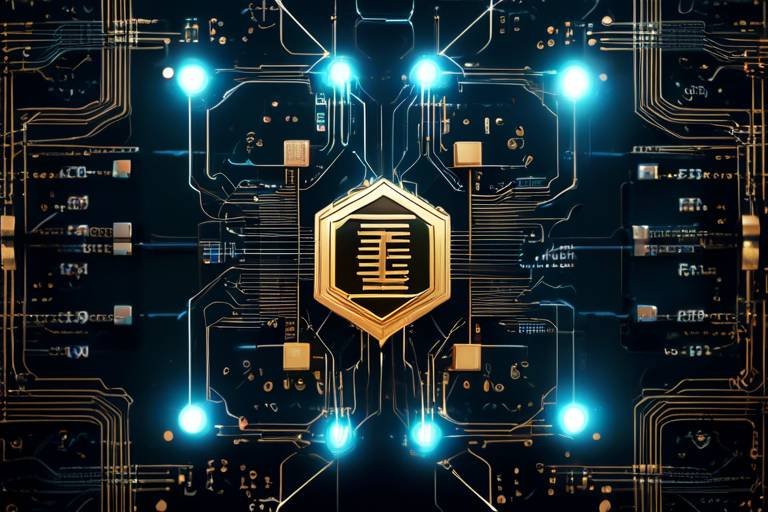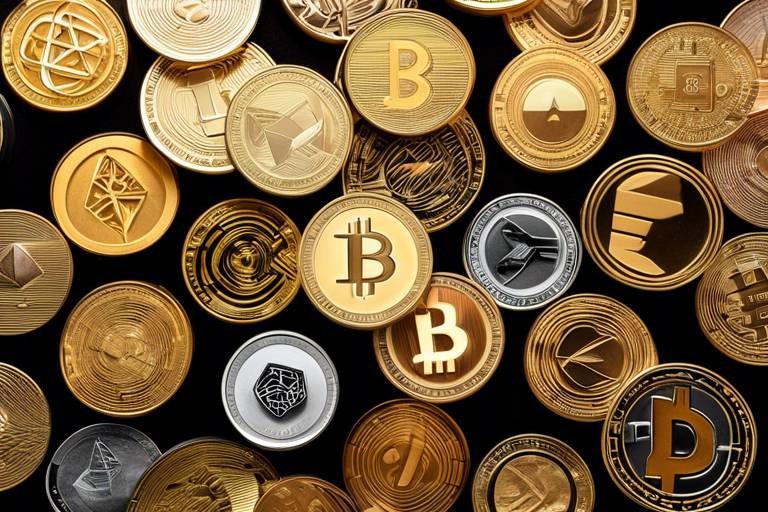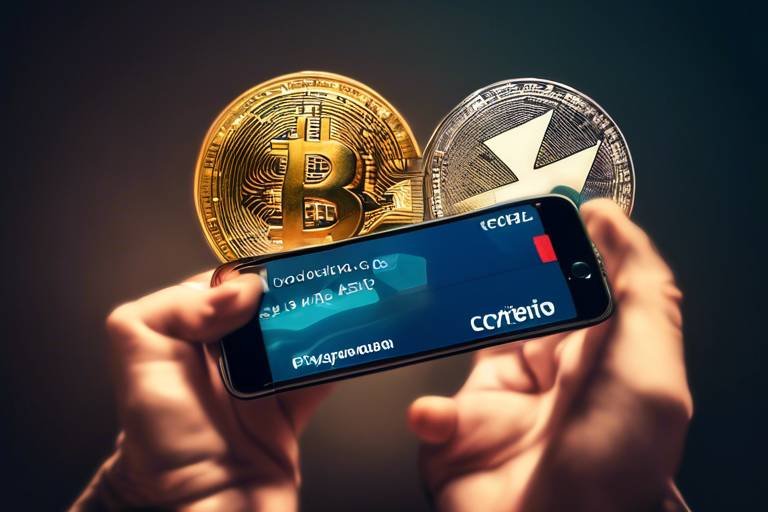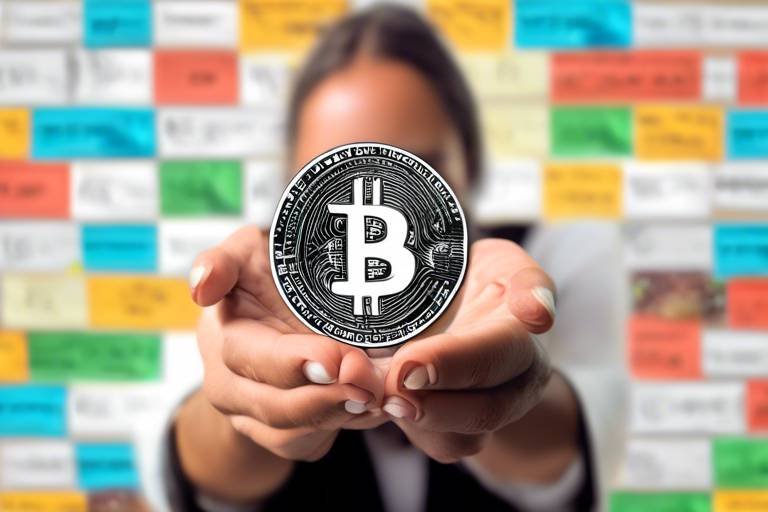The Future of Decentralized Exchanges (DEXs)
The world of cryptocurrency is evolving at a breakneck pace, and at the forefront of this revolution are Decentralized Exchanges (DEXs). These platforms are not just a passing trend; they represent a significant shift in how we think about trading digital assets. Imagine a marketplace where you can exchange goods directly with others without a middleman taking a cut. That’s the essence of DEXs! They empower users by eliminating the need for centralized authorities, offering a glimpse into a more decentralized future where financial independence reigns supreme.
As we dive deeper into the future of DEXs, we must first understand their core functionalities. Unlike traditional exchanges that operate under a centralized model, DEXs facilitate peer-to-peer trading. Users maintain control of their funds through their wallets, significantly reducing the risk of hacks that plague centralized platforms. This fundamental difference is what sets DEXs apart and makes them a compelling choice for many traders.
Looking ahead, the potential for DEXs is immense. With the integration of advanced technologies such as blockchain and smart contracts, we are witnessing a transformation that could redefine the entire cryptocurrency landscape. The ability to automate trades without intermediaries not only streamlines the process but also enhances trust and transparency. As more people become aware of the benefits of decentralized trading, we can expect a surge in participation, leading to an even more vibrant and diverse marketplace.
However, it's not all sunshine and rainbows. DEXs face their fair share of challenges. Issues such as liquidity, regulatory scrutiny, and user experience can hinder their growth. For instance, attracting sufficient liquidity to ensure smooth trading can be a daunting task. Without enough participants, the trading experience can be less than ideal, leading to slippage and frustration for users. Nevertheless, innovative solutions are being explored to tackle these challenges head-on, paving the way for a more robust DEX ecosystem.
In conclusion, the future of decentralized exchanges is bright, filled with opportunities for growth and innovation. As they continue to evolve, we can expect to see a more democratized financial landscape where users have greater control over their assets. The road ahead may be fraught with challenges, but the potential rewards make it an exciting time to be involved in the world of DEXs. Are you ready to embrace the future of trading?
- What are decentralized exchanges (DEXs)?
DEXs are trading platforms that allow users to trade cryptocurrencies directly with one another without a central authority. - How do DEXs ensure security?
DEXs use smart contracts and user-controlled wallets to minimize risks and enhance security for traders. - What challenges do DEXs face?
Some challenges include liquidity issues, regulatory scrutiny, and the need for improved user experience. - What is the future of DEXs?
The future of DEXs looks promising with advancements in technology and increasing user adoption, leading to a more decentralized financial ecosystem.

Understanding Decentralized Exchanges
Decentralized exchanges, or DEXs, are revolutionizing the way we think about trading cryptocurrencies. Unlike traditional exchanges, which operate under a central authority, DEXs enable users to trade directly with one another. This direct trading mechanism is akin to a bustling marketplace where buyers and sellers interact freely, without the interference of a middleman. At their core, DEXs leverage blockchain technology to ensure that transactions are secure, transparent, and immutable. But what exactly does this mean for the average trader?
One of the most significant aspects of DEXs is their ability to facilitate peer-to-peer trading. This means that when you want to buy or sell a cryptocurrency, you can do so without having to trust a centralized entity to hold your funds. Instead, your transaction is executed through smart contracts, which are self-executing contracts with the terms of the agreement directly written into code. Think of smart contracts as digital vending machines; you put in your cryptocurrency, and the machine automatically dispenses the asset you want, all without human intervention. This not only speeds up the trading process but also significantly reduces the risk of fraud.
Moreover, DEXs operate on a variety of blockchain networks, which allows for greater flexibility and accessibility. Traders can choose from numerous platforms based on their preferences for speed, fees, and available cryptocurrencies. For instance, some popular DEXs include Uniswap, SushiSwap, and PancakeSwap, each offering unique features and benefits. The variety in DEX platforms means that users can find one that best suits their trading style, whether they are looking for advanced trading tools or simply a user-friendly interface.
Another key differentiator of DEXs is the concept of non-custodial trading. In traditional exchanges, users must deposit their funds into the exchange's wallet, which can expose them to risks such as hacks or insolvency. In contrast, DEXs allow users to retain control over their private keys and funds. This means that you are the only one who can access your assets, providing a layer of security that is hard to match. However, with great power comes great responsibility; users must take extra precautions to safeguard their private keys, as losing them can mean losing access to their funds permanently.
While DEXs offer numerous advantages, they also come with their own set of challenges. For instance, the user experience on many DEX platforms can be less intuitive compared to their centralized counterparts. This might deter newcomers who are not familiar with blockchain technology or the process of using a decentralized platform. Additionally, the liquidity on DEXs can sometimes be lower than on traditional exchanges, which can lead to slippage when executing trades. Slippage occurs when the price at which a trade is executed differs from the expected price due to a lack of available liquidity.
In summary, decentralized exchanges represent a significant advancement in the cryptocurrency trading landscape. They empower users by providing greater control, security, and privacy. However, as with any emerging technology, it's essential to navigate the complexities and challenges that come with it. As the market continues to evolve, DEXs are expected to play an increasingly vital role in shaping the future of finance, offering a glimpse into a more decentralized and equitable trading environment.
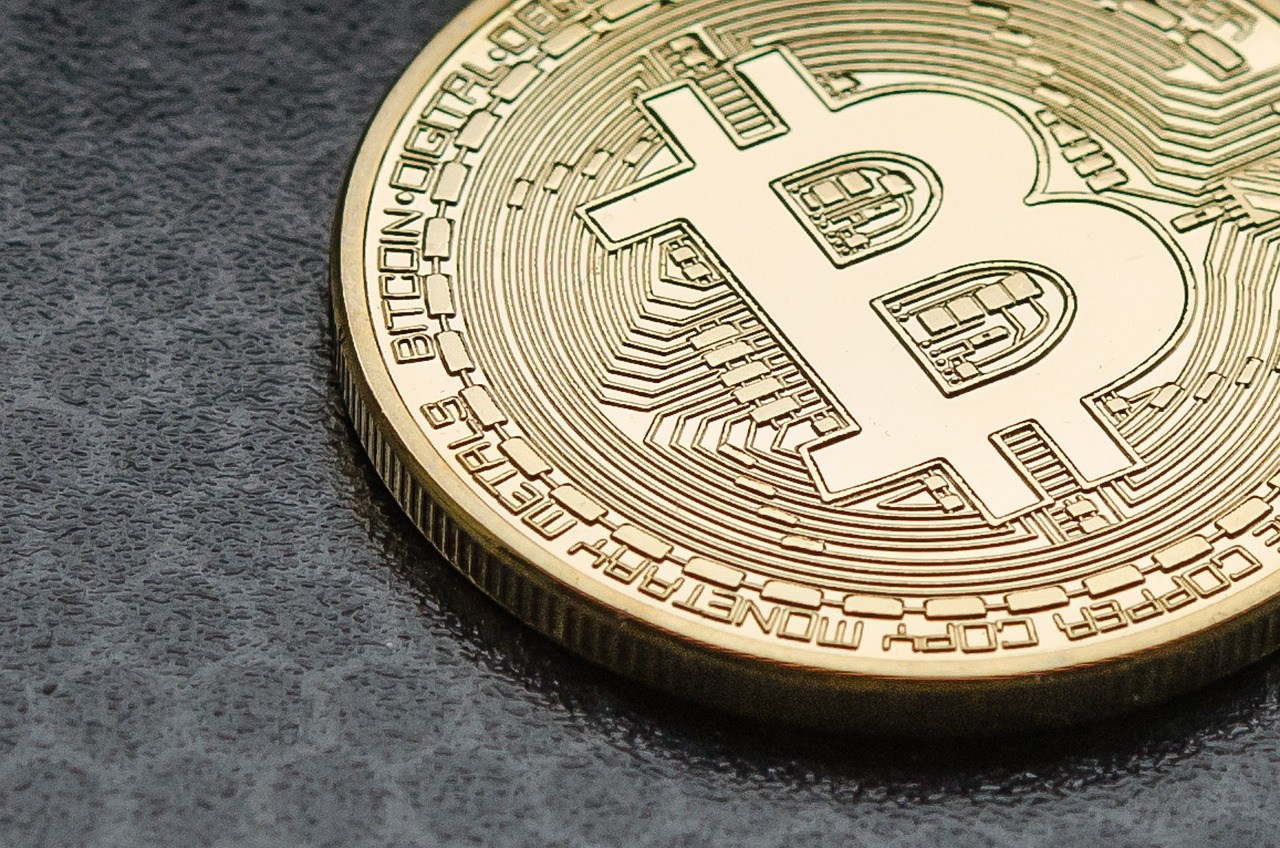
Benefits of DEXs
The rise of decentralized exchanges (DEXs) is reshaping the landscape of cryptocurrency trading, providing users with a plethora of benefits that traditional exchanges simply can't match. One of the standout features of DEXs is the enhanced security they offer. Unlike centralized platforms, which are often vulnerable to hacks and data breaches, DEXs operate on a peer-to-peer basis. This means that users trade directly with one another, eliminating the need for a middleman and significantly reducing the risk of theft. Imagine trading in a marketplace where your funds are always in your control, rather than sitting in a potentially insecure vault!
Moreover, DEXs empower users with privacy and anonymity. In a world where personal data is a prized possession for corporations, the ability to trade without revealing your identity is incredibly appealing. DEXs allow users to maintain their privacy, ensuring that their trading activities remain confidential. This is particularly important for those who value their financial independence and wish to keep their investment strategies under wraps.
Another significant benefit of DEXs is the level of control they provide over one's assets. With traditional exchanges, you often have to trust the platform to safeguard your funds. However, with DEXs, users retain full ownership of their assets through user-controlled wallets. This feature is crucial in protecting against hacks and unauthorized access. It's like having your own personal safe where only you have the key, rather than relying on a bank that could be compromised.
Additionally, DEXs often feature lower trading fees compared to their centralized counterparts. This is because they eliminate the need for intermediaries and reduce operational costs. Users can enjoy a more cost-effective trading experience, allowing them to maximize their profits. Imagine being able to keep more of your hard-earned money instead of handing it over to a platform for fees!
Furthermore, DEXs offer a wider variety of trading pairs and tokens. Since they are not limited by the same regulatory constraints as centralized exchanges, DEXs can list a broader range of cryptocurrencies. This opens up opportunities for traders to explore niche markets and invest in emerging projects that may not yet be available on traditional platforms. It’s like having access to a vast buffet of investment options, where you can choose what suits your taste!
In summary, the benefits of decentralized exchanges are numerous and significant. They offer enhanced security, privacy, control over assets, lower fees, and a diverse range of trading options. As the cryptocurrency ecosystem continues to evolve, DEXs are likely to play a pivotal role in promoting financial independence and democratizing access to trading.
- What are decentralized exchanges?
Decentralized exchanges (DEXs) are platforms that allow users to trade cryptocurrencies directly with one another without a central authority.
- How do DEXs enhance security?
DEXs minimize risks through smart contracts and user-controlled wallets, reducing the chances of hacks and theft.
- Are DEXs anonymous?
Yes, DEXs offer a high level of privacy and anonymity, allowing users to trade without disclosing their identities.
- What are the fees associated with DEXs?
Generally, DEXs have lower trading fees compared to centralized exchanges due to the lack of intermediaries.
- Can I trade any cryptocurrency on a DEX?
While DEXs offer a wider variety of tokens, the availability of specific cryptocurrencies may vary from one platform to another.
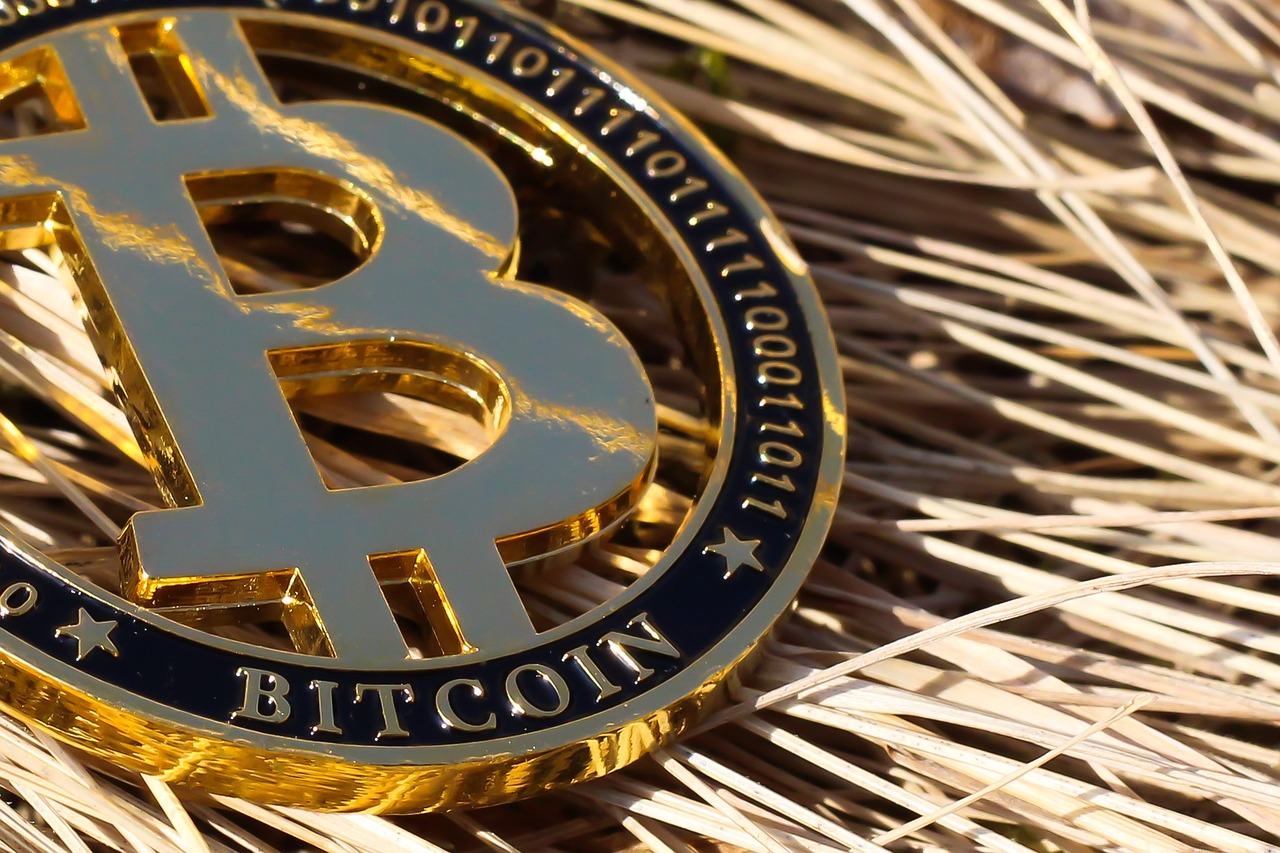
Enhanced Security Features
When it comes to trading cryptocurrencies, security is not just an option; it's a necessity. Decentralized exchanges (DEXs) have revolutionized the way we think about trading by providing a level of security that traditional exchanges often struggle to match. One of the standout features of DEXs is their reliance on smart contracts and user-controlled wallets, which together create a robust environment for traders to operate in.
Let’s dive deeper into how these features enhance security. First off, smart contracts are self-executing contracts with the terms of the agreement directly written into code. This means that once the conditions are met, the contract executes automatically without the need for a third party. By eliminating intermediaries, DEXs reduce the risk of fraud and manipulation. Imagine a vending machine: you insert your money, make your selection, and the machine delivers your snack without any need for a cashier. Similarly, smart contracts streamline transactions, ensuring that both parties fulfill their obligations before any assets change hands.
Moreover, the use of user-controlled wallets is a game-changer. On a DEX, you hold the keys to your own wallet, which means you have full control over your funds. This is in stark contrast to centralized exchanges where your assets are stored in the exchange's wallets, making them vulnerable to hacks and theft. With a user-controlled wallet, even if a DEX were to face a security breach, your assets remain safe as they are not stored on the platform itself. It’s like keeping your valuables in a safe at home rather than in a bank that could be robbed.
To illustrate the difference in security between DEXs and centralized exchanges, consider the following table:
| Feature | Decentralized Exchanges (DEXs) | Centralized Exchanges |
|---|---|---|
| Control of Funds | User-controlled wallets | Exchange-controlled wallets |
| Transaction Execution | Smart contracts | Intermediary required |
| Vulnerability to Hacks | Lower risk | Higher risk |
In conclusion, the enhanced security features of decentralized exchanges are not just technical jargon; they represent a significant shift towards a more secure trading environment. By leveraging smart contracts and user-controlled wallets, DEXs empower users to take charge of their assets while minimizing risks associated with centralized platforms. As the cryptocurrency landscape continues to evolve, these security measures will play a pivotal role in attracting more users who prioritize safety in their trading activities.
- What are decentralized exchanges?
Decentralized exchanges (DEXs) are trading platforms that allow users to trade cryptocurrencies directly with one another without a central authority.
- How do smart contracts work?
Smart contracts are self-executing contracts with the terms written into code, which automate transactions and reduce the need for intermediaries.
- Why are user-controlled wallets important?
User-controlled wallets give individuals ownership of their funds, protecting them from hacks and theft that can occur on centralized exchanges.
- Are DEXs safer than centralized exchanges?
While no platform is completely risk-free, DEXs generally offer enhanced security features that reduce vulnerabilities compared to centralized exchanges.

Smart Contracts Explained
When we talk about decentralized exchanges (DEXs), one of the most fascinating components that keep them running smoothly is the concept of smart contracts. But what exactly are smart contracts? Imagine them as digital vending machines: you put in your money (or crypto), select what you want, and voilà, you receive your item without needing a cashier to handle the transaction. In the world of DEXs, smart contracts automate the trading process, ensuring that trades happen as intended without the need for a middleman. This not only speeds up transactions but also significantly reduces the potential for fraud.
Smart contracts operate on blockchain technology, which is essentially a public ledger that records all transactions. This means that every trade executed through a smart contract is transparent and verifiable by anyone on the network. So, if you’re trading Bitcoin for Ethereum on a DEX, the smart contract will automatically execute the trade once both parties fulfill the pre-set conditions. No more waiting for approval from a centralized authority or worrying about whether the other party will hold up their end of the bargain. This is a game-changer for traders who crave trust and efficiency.
One of the standout features of smart contracts is their self-executing nature. They run on code that’s written into the blockchain, which means once they’re deployed, they can’t be altered or tampered with. This immutability is crucial because it ensures that once the terms of the contract are agreed upon, they cannot be changed mid-transaction. It’s like setting a rule in stone; everyone knows what to expect, and there’s no room for misinterpretation.
However, while smart contracts are revolutionary, they are not without their challenges. Bugs in the code can lead to vulnerabilities, potentially allowing malicious actors to exploit them. This is why the community places a strong emphasis on auditing smart contracts before they go live. In fact, many successful DEXs have strict protocols in place to ensure that their smart contracts are thoroughly tested and audited.
In summary, smart contracts are the backbone of decentralized exchanges, providing a level of automation, security, and transparency that traditional exchanges simply can’t match. As technology evolves, we can expect to see even more sophisticated smart contracts that will enhance the trading experience and push the boundaries of what’s possible in the realm of cryptocurrency. The future is bright, and smart contracts are undoubtedly leading the charge towards a more decentralized and user-friendly trading environment.

User-Controlled Wallets
When it comes to cryptocurrency, the phrase "not your keys, not your coins" resonates deeply with traders and investors alike. This saying emphasizes the significance of in the realm of decentralized exchanges (DEXs). Unlike traditional exchanges where users deposit their funds into the platform's wallets, DEXs empower individuals to maintain control over their assets. This fundamental shift is akin to owning a safe in your home rather than relying on a bank to safeguard your valuables.
User-controlled wallets come in various forms, including hardware wallets, software wallets, and even paper wallets. Each type offers unique advantages and caters to different user needs. For instance, hardware wallets, which store private keys offline, provide an exceptional level of security against online threats. On the other hand, software wallets offer convenience and ease of access, making them ideal for everyday transactions. The choice between these wallets often boils down to a balance between security and usability.
One of the most significant benefits of user-controlled wallets is the enhanced security they offer. By retaining ownership of their private keys, users significantly reduce the risk of hacks and theft that have plagued centralized exchanges. In a world where cyber threats are ever-evolving, this self-custody model serves as a fortress for one’s digital assets. Moreover, users can implement additional security measures, such as two-factor authentication and biometric locks, further fortifying their wallets against unauthorized access.
However, with great power comes great responsibility. Users must be vigilant in managing their wallets and safeguarding their private keys. Losing access to a private key often means losing access to the funds forever—a stark reminder that while DEXs offer control, they also require users to be proactive in their security practices. Educating oneself about wallet management is crucial; after all, a little knowledge can go a long way in protecting one's investments.
In conclusion, user-controlled wallets are a cornerstone of the decentralized exchange experience. They not only provide users with the ability to manage their funds independently but also significantly enhance security and privacy. As the cryptocurrency landscape continues to evolve, the importance of these wallets will only grow, making them an essential tool for anyone looking to navigate the world of digital assets effectively.
- What are user-controlled wallets?
User-controlled wallets are digital wallets that allow users to maintain ownership of their private keys, granting them full control over their cryptocurrency assets.
- How do I secure my user-controlled wallet?
To secure your wallet, consider using hardware wallets for offline storage, enable two-factor authentication, and regularly back up your wallet information.
- What happens if I lose my private key?
If you lose your private key, you will lose access to your funds permanently, highlighting the importance of safe key management.

Privacy and Anonymity
In a world where data breaches and privacy concerns are rampant, the allure of decentralized exchanges (DEXs) lies significantly in their ability to offer users a degree of that traditional exchanges often fail to provide. Imagine walking into a store without anyone knowing your identity—this is the kind of experience DEXs aim to replicate in the digital trading space. Unlike centralized platforms that require extensive personal information and often share that data with third parties, DEXs allow users to trade directly with one another, maintaining control over their personal data.
One of the key features that enhance privacy on DEXs is the use of pseudonymous transactions. When you trade on a DEX, you typically interact using a wallet address rather than your real name. This means that while transactions are recorded on the blockchain, they are not directly linked to your identity. However, it's essential to note that while your wallet address may not reveal your identity at first glance, advanced blockchain analysis techniques can potentially trace transactions back to individuals. Therefore, while DEXs offer more privacy than traditional exchanges, users should still exercise caution and consider additional privacy measures.
Moreover, DEXs often do not require Know Your Customer (KYC) procedures, which are mandatory on many centralized platforms. This absence of KYC means that users can trade without having to submit personal documents or undergo identity verification processes. This is a game-changer for those who prioritize their privacy and wish to keep their trading activities discreet. However, this lack of regulation can also pose risks, as it may attract malicious actors seeking to exploit the system.
To further emphasize the importance of privacy on DEXs, consider the following points:
- Data Ownership: Users retain ownership of their data and funds, reducing the risk of hacks and unauthorized access.
- Minimal Disclosure: With less personal information required, the risk of data breaches is significantly lower.
- Decentralized Control: Users have full control over their trades and funds, eliminating the need to trust a central authority.
In conclusion, the privacy and anonymity offered by decentralized exchanges are substantial advantages that attract users seeking a more secure trading environment. While these platforms do provide a layer of protection against identity theft and data breaches, users must remain vigilant and informed about the potential risks involved. As the cryptocurrency landscape evolves, the demand for privacy-focused solutions will likely continue to grow, shaping the future of trading in the digital age.
- What is a decentralized exchange?
A decentralized exchange (DEX) allows users to trade cryptocurrencies directly with one another without a central authority. - How do DEXs ensure privacy?
DEXs use pseudonymous wallet addresses and do not require extensive personal information, allowing users to trade more privately. - Are DEXs completely anonymous?
While DEXs provide more privacy than centralized exchanges, advanced techniques can potentially link transactions back to users. - What are the risks of trading on a DEX?
Risks include potential hacks, lack of regulatory oversight, and the possibility of encountering malicious actors.

Challenges Facing DEXs
Despite the exciting potential and numerous benefits that decentralized exchanges (DEXs) offer, they are not without their challenges. As the cryptocurrency landscape continues to evolve, DEXs face significant hurdles that could impact their growth and adoption. One of the most pressing issues is liquidity. Unlike centralized exchanges, which can attract large volumes of trades, DEXs often struggle to provide the same level of liquidity. This can lead to slower transaction times and higher price slippage, which can be frustrating for traders looking to execute large orders. To tackle this problem, DEXs are exploring various solutions, such as liquidity pools and incentivized staking programs that encourage users to contribute their assets in exchange for rewards.
Another major challenge is regulatory scrutiny. As DEXs gain traction, they are beginning to catch the attention of regulatory bodies around the world. Governments are increasingly concerned about the potential for money laundering, fraud, and other illicit activities that can occur on these platforms. This has led to calls for stricter regulations that could impose compliance burdens on DEX operators. The evolving legal landscape poses a significant risk to the operational models of many DEXs, as they may need to adapt to new laws and regulations that could alter their fundamental nature.
User experience is yet another area where DEXs often fall short. While they provide enhanced security and privacy, the interfaces can be complex and intimidating for new users. Many DEXs require a certain level of technical knowledge, which can deter potential users who are not familiar with cryptocurrency trading. To improve user experience, DEX platforms are increasingly focusing on simplifying their interfaces and providing educational resources to help users navigate the complexities of decentralized trading.
In summary, while DEXs are paving the way for a more decentralized financial future, they must address several critical challenges to thrive. By improving liquidity, navigating the regulatory landscape, and enhancing user experience, DEXs can solidify their place in the cryptocurrency market and continue to promote financial independence for users worldwide.
- What are decentralized exchanges (DEXs)? DEXs are trading platforms that allow users to trade cryptocurrencies directly with one another without a central authority.
- How do DEXs ensure security? DEXs use smart contracts and user-controlled wallets to minimize risks and provide users with ownership of their funds.
- What challenges do DEXs face? Key challenges include liquidity issues, regulatory scrutiny, and user experience difficulties.
- Can DEXs compete with centralized exchanges? While DEXs offer unique advantages, they must overcome their challenges to compete effectively with centralized platforms.

Liquidity Concerns
When diving into the world of decentralized exchanges (DEXs), one of the most significant challenges that emerges is liquidity. You might be asking yourself, "What exactly is liquidity, and why should I care?" Well, think of liquidity as the lifeblood of any trading platform. It refers to how easily assets can be bought or sold without causing a drastic change in their price. In the realm of DEXs, achieving high liquidity is crucial for ensuring that traders can execute their orders quickly and at favorable prices.
One major hurdle for DEXs is that they often struggle to attract sufficient liquidity compared to their centralized counterparts. This can lead to situations where a trader wants to buy or sell a cryptocurrency, but there aren't enough buyers or sellers to facilitate that transaction smoothly. As a result, traders might face slippage, which is when the final price of the trade differs from the expected price. This can be frustrating and can deter users from utilizing these platforms.
To combat liquidity issues, many DEXs are implementing innovative solutions. For instance, they are experimenting with liquidity pools, where users can contribute their assets to a communal pool in exchange for rewards. This not only incentivizes liquidity provision but also helps create a more stable trading environment. However, even with these mechanisms in place, DEXs still face the challenge of convincing users to participate in liquidity provision, especially when centralized exchanges often offer better incentives and lower fees.
Moreover, the liquidity landscape can vary significantly across different DEXs. For example, some platforms may specialize in specific tokens or trading pairs, leading to uneven liquidity distribution. This inconsistency can be a double-edged sword—while it allows for niche markets to thrive, it can also result in fragmented trading experiences for users. To illustrate this point, consider the following table that compares liquidity levels across several popular DEXs:
| DEX Name | Average Daily Trading Volume (USD) | Number of Active Liquidity Providers | Common Trading Pairs |
|---|---|---|---|
| Uniswap | $1.5 billion | 10,000+ | ETH/USDT, DAI/USDC |
| SushiSwap | $500 million | 5,000+ | SUSHI/ETH, USDT/USDC |
| PancakeSwap | $2 billion | 15,000+ | CAKE/BNB, BUSD/USDT |
As you can see, the differences in liquidity can be stark. The more liquidity a DEX has, the more attractive it becomes to traders. Therefore, finding ways to enhance liquidity is essential for the growth and sustainability of decentralized exchanges.
In conclusion, while liquidity concerns present a significant challenge for DEXs, the innovative solutions being developed could pave the way for a more robust trading environment. As these platforms continue to evolve, it will be fascinating to see how they address liquidity issues and what new strategies emerge to attract both traders and liquidity providers.
- What is liquidity in the context of DEXs? Liquidity refers to how easily assets can be traded without affecting their price significantly. High liquidity allows for smoother transactions.
- Why do DEXs struggle with liquidity? DEXs often have fewer active traders compared to centralized exchanges, leading to less buying and selling activity, which can create liquidity issues.
- How do liquidity pools work? Liquidity pools allow users to contribute their assets to a shared pool, which is then used to facilitate trades. In return, liquidity providers earn rewards.

Regulatory Landscape
The world of decentralized exchanges (DEXs) is not just a playground for tech enthusiasts and cryptocurrency traders; it’s also a battleground for regulatory frameworks. As DEXs gain traction and attract a growing user base, they inevitably draw the attention of regulators who are keen on ensuring consumer protection, preventing illicit activities, and maintaining market integrity. The regulatory landscape surrounding DEXs is complex and constantly evolving, making it a critical area for anyone involved in cryptocurrency to understand.
One of the primary challenges DEXs face is the lack of a centralized authority. Unlike traditional exchanges, which are often regulated by specific financial authorities, DEXs operate on a peer-to-peer basis. This decentralized nature raises questions about accountability and compliance. Regulators are grappling with how to classify these platforms: Are they simply software tools, or do they represent a new type of financial institution? This ambiguity can lead to inconsistent regulations across different jurisdictions, creating uncertainty for users and developers alike.
In recent years, several countries have begun to establish clearer guidelines for DEXs. For example, the European Union is working on the Markets in Crypto-Assets (MiCA) regulation, which aims to provide a comprehensive framework for all cryptocurrency activities, including DEXs. Similarly, the U.S. Securities and Exchange Commission (SEC) has been scrutinizing various aspects of decentralized finance (DeFi), including whether some tokens traded on DEXs qualify as securities under existing laws.
As a result, DEX operators are increasingly finding themselves in a regulatory gray area. They must navigate the intricate web of laws while trying to maintain the core principles of decentralization and user autonomy. This often leads to a delicate balancing act where DEXs aim to comply with regulations without sacrificing their foundational ethos. For instance, some DEXs are implementing Know Your Customer (KYC) protocols to appease regulators, which raises concerns about privacy and the very anonymity that attracts users to these platforms.
Despite these challenges, the evolving regulatory landscape can also present opportunities. As regulations become clearer, they can pave the way for wider adoption of DEXs by providing a framework that ensures consumer protection and market stability. This could ultimately enhance the legitimacy of the entire cryptocurrency ecosystem, attracting institutional investors who have been hesitant to engage with the market due to regulatory uncertainties.
In conclusion, the regulatory landscape for decentralized exchanges is a double-edged sword. While it poses significant challenges, it also offers a pathway toward greater acceptance and integration of DEXs into the broader financial system. As we move forward, it will be crucial for stakeholders in the cryptocurrency space to stay informed and engaged with regulatory developments to ensure that DEXs can thrive in a compliant and sustainable manner.
- What are decentralized exchanges (DEXs)?
DEXs allow users to trade cryptocurrencies directly with one another without the need for a central authority or intermediary. - Why are regulations important for DEXs?
Regulations help ensure consumer protection, prevent fraud, and maintain market integrity, which can foster greater trust in the cryptocurrency ecosystem. - How do DEXs differ from traditional exchanges?
Unlike traditional exchanges, DEXs operate on a peer-to-peer basis, offering users greater control over their assets and enhanced privacy. - What challenges do DEXs face regarding liquidity?
DEXs often struggle to attract sufficient liquidity, which can impact trading volume and price stability. - What does the future hold for DEXs?
As technology advances and regulations evolve, DEXs are poised for growth, with potential innovations that could reshape the cryptocurrency market.

The Future of DEXs
The future of decentralized exchanges (DEXs) is not just a fleeting trend; it represents a seismic shift in how we perceive and interact with financial systems. As the cryptocurrency landscape continues to evolve, DEXs are poised to become the backbone of a more inclusive and transparent financial ecosystem. With their unique ability to operate without a central authority, DEXs are paving the way for a new era of trading that emphasizes user autonomy and privacy.
One of the most exciting prospects for DEXs is the integration of advanced technologies such as artificial intelligence (AI) and machine learning. These technologies can enhance trading strategies, optimize liquidity, and provide personalized user experiences. Imagine a DEX that can analyze market trends in real-time and offer tailored trading recommendations based on your preferences. This level of customization not only empowers traders but also promotes a more dynamic trading environment.
Moreover, as blockchain technology matures, we can expect DEXs to adopt more sophisticated liquidity solutions. For instance, automated market makers (AMMs) are already revolutionizing how liquidity is provided in decentralized ecosystems. By allowing users to become liquidity providers, DEXs can ensure smoother trading experiences and reduce slippage—a common pain point for traders. The future of liquidity on DEXs looks promising, with innovative solutions that could attract more users and capital.
In addition to technological advancements, regulatory clarity will play a crucial role in shaping the future of DEXs. As governments worldwide begin to formulate regulations surrounding cryptocurrencies, DEXs that comply with these regulations will likely gain increased legitimacy and user trust. This regulatory framework could also lead to a more stable trading environment, encouraging institutional investors to participate in decentralized markets. A well-regulated DEX could be a game-changer, bridging the gap between traditional finance and the decentralized world.
Furthermore, the growing demand for financial independence and control over personal assets will continue to drive the adoption of DEXs. Users are increasingly wary of centralized platforms that can impose restrictions or even seize funds. DEXs offer an alternative where users have complete control over their assets, fostering a sense of empowerment that is hard to replicate in traditional finance. This shift towards self-custody and independence aligns perfectly with the ethos of the cryptocurrency movement.
As we look to the horizon, the trajectory of DEXs seems bright. The convergence of technology, regulatory acceptance, and user demand will likely culminate in a vibrant ecosystem that not only challenges traditional exchanges but also enhances the overall cryptocurrency experience. The future of DEXs is not just about trading; it's about creating a new financial paradigm that prioritizes security, privacy, and autonomy.
- What are decentralized exchanges (DEXs)?
DEXs are cryptocurrency trading platforms that operate without a central authority, allowing users to trade directly with one another through smart contracts. - What are the benefits of using DEXs?
DEXs offer enhanced security, privacy, and control over assets, minimizing risks associated with centralized exchanges. - How do DEXs ensure security?
DEXs utilize smart contracts and user-controlled wallets to automate transactions and give users ownership of their funds, respectively. - What challenges do DEXs face?
Liquidity issues, regulatory scrutiny, and user experience are some of the significant challenges that DEXs need to address to thrive. - What does the future hold for DEXs?
The future of DEXs is promising, with anticipated advancements in technology, regulatory clarity, and increased user demand for financial independence.
Frequently Asked Questions
-
What are decentralized exchanges (DEXs)?
Decentralized exchanges (DEXs) are trading platforms that operate without a central authority. They allow users to trade directly with one another, facilitating peer-to-peer transactions. This means you can swap cryptocurrencies without relying on a third-party service, giving you greater control over your assets.
-
What are the main benefits of using a DEX?
Using a DEX offers several advantages, including enhanced security, privacy, and control over your funds. Unlike traditional exchanges, DEXs do not hold your assets, which significantly reduces the risk of hacks and theft. Additionally, they provide a level of anonymity that many users appreciate, as your personal information is not required to trade.
-
How do smart contracts work in DEXs?
Smart contracts are self-executing contracts with the terms of the agreement directly written into code. In a DEX, they automate transactions, ensuring that trades occur only when specific conditions are met. This eliminates the need for intermediaries, making transactions faster and more transparent.
-
What challenges do DEXs face?
Despite their benefits, DEXs encounter challenges such as liquidity issues, regulatory scrutiny, and user experience hurdles. Liquidity is crucial for efficient trading, and many DEXs struggle to attract enough users to facilitate smooth transactions. Additionally, as they grow in popularity, they face increasing attention from regulators, which could impact their operations.
-
Will DEXs become more popular in the future?
Yes! The future of DEXs looks promising, with ongoing technological advancements and increasing user interest. As more people seek financial independence and privacy in their trading activities, decentralized exchanges are likely to play a significant role in shaping the cryptocurrency market.





